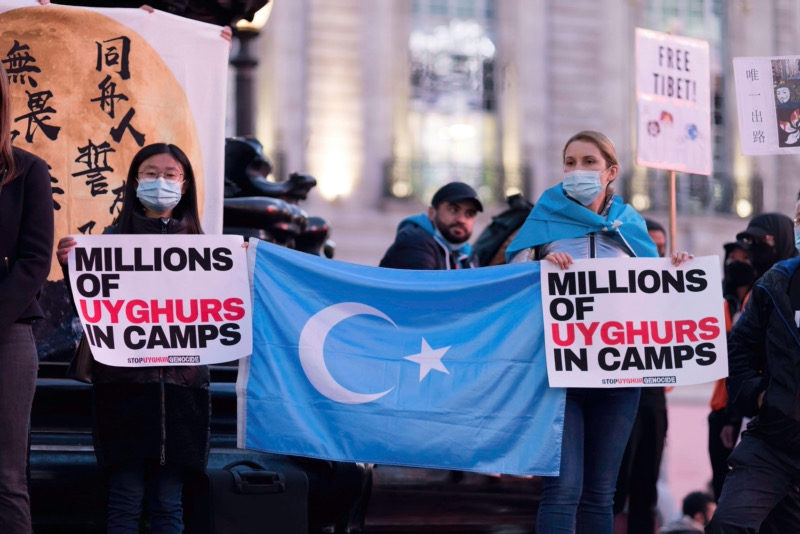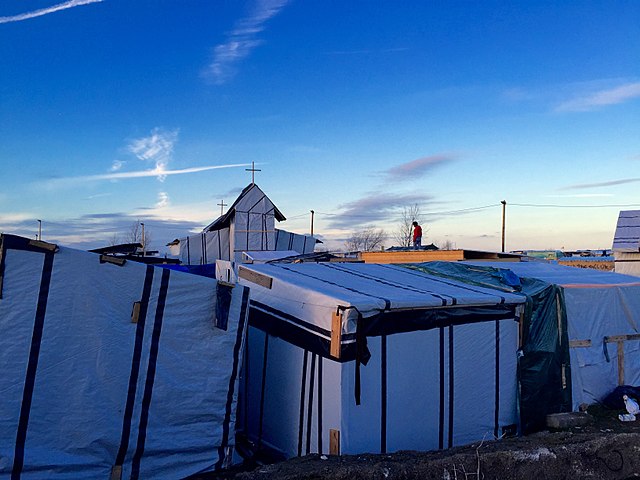On 11 October, my friend and former colleague Fr Philippe Demeestere SJ began a hunger strike alongside human rights activists Anaïs Vogel and Ludovic Holbin, calling for a halt to the evictions of the Calais migrant camps. Returning to Calais last week, where I worked in the camps for four years, I witnessed the increasing devastation wrought by these evictions.
There are now an estimated 1500 people living in the small migrant camps which are dotted across the disused industrial sites and woodland of Calais. Walking nearby the local football stadium, I saw one such camp where around forty refugees sat by their little tents, boiling tea on improvised woodfires. Some Eritreans in the camp invited me over for a cup of tea and a chat. As we talked, I watched the weary faces of these young men give way to smiles and expressions of hope that they will one day safely reach the UK.
The scene stood in sharp contrast to the dismantled camp I saw near the Calais hospital, which had recently been erased by the authorities. There, battered by the wind and rain, a few refugees remained, walking about looking hopelessly for things they had left behind. Nearby, I saw bushes and trees being cleared from the evicted area, which until recently had been home to a few hundred refugees. Alex, a long-time English volunteer in Calais, said most of the people there had been “shoved into buses and moved to other places in France”.
For months now, the Mayor of Calais, Nathasha Bouchaert, has sought to move refugees out of sight by subjecting the camps to near-daily evictions. They are dispersed by police and any unattended belongings are removed. Many of the areas are then cleared, with three-metre-high security fences erected to prevent people re-entering. Even areas under highway bridges are fenced off to prevent refugees sheltering there; whilst riot police are being strategically placed throughout the town in places refugees otherwise might gather.
In the hope of driving even more refugees out of the town, injunctions have now been enacted which the hunger strikers say are ‘making it illegal’ for volunteer groups to help vulnerable people in the Calais camps. In a communiqué, they cited one instance in which ‘the state has placed big pieces of rock on places of distribution [for food and clothes] in Coquelles, making it impossible for NGOs to access the sites to provide for the basic needs of people.’
Staff at the Caritas Calais day centre explain to me that these support restrictions, combined with the evictions and dispossessions, were now “putting lives in danger”. Mariam tells me that many refugees are now left ‘without a cover or blankets in this weather’; whilst Juliet adds that their desperate situations make them ‘prey for people smugglers and traffickers’.
The hunger strike itself began in response to the death a month ago of Yasser, a 16-year-old Sudanese boy who was hit by a lorry in Calais as he tried to make the dangerous journey across the channel. The hunger strike is to continue until 2 November, All Souls’ Day, when they will commemorate all those who have died trying to cross the border. As I write this article, I hear news of yet another refugee struck dead by a lorry: the 305th victim of this hostile environment.
As noted by Matthieu Tardis, an expert in migration policy at the French Institute of International Relations, the primary reason for people undertaking these dangerous migrant channel crossings is simply that “the bad conditions they experience in France, in Italy, in other EU countries, pushes them to go even further, to think that in the UK it will be better”. This highlights the contradictory response of the British government, which not only proposes a potentially illegal pushback policy to turn back migrant boats on the channel, but which also assists in funding the Calais authorities’ camp erasures that push refugees toward such desperate measures and dangerous crossings in the first place.
This continual attempt to push migrants to the margins explains the hunger strikers’ reasons for bringing the issue of the camps back to the centre. Saint-Pierre church is situated right in the heart of the town and the campaigners there have begun to attract the attention of many, not only in Calais, but throughout France and beyond. National and international media coverage of the hunger strike is growing daily, a French government envoy has been sent to speak to the campaigners, and the local Bishop of Arras, Olivier Leborgne, joined by the head of Caritas France, recently visited the campaigners to offer support.
Speaking at the church, Bishop Leborgne condemned the treatment of refugees in Calais. ‘We do not have the right to treat them as we are treating them today,’ he said. This, he argued, was not a question of taking a political position, but of simply asking: “Is a human person a human person?”
The refugees themselves appear touched by the efforts of the campaigners. One of the young Eritrean refugees I met in Calais spoke warmly about the “good heart” of the hunger strikers. Whether or not the hunger strike will actually improve their desperate situation remains to be seen, but it has at least brought the issue back to light and to the heart of the Christian community of Calais.
Br Johannes Maertens is a missionary monk of the Community of the Good Shepherd. Sign the petition calling for action here.



 Loading ...
Loading ...
What do you think?
You can post as a subscriber user ...
User comments (0)